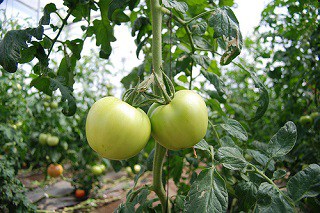
What began as demand from EU countries for organically-grown traditional Turkish dried fruits and nuts soon developed into a growing phenomenon. Today, organic produce is making its way into Turkish grocery stores and markets, responding to the Turkish consumers’ increasing awareness about the harm posed by chemical fertilizers and reckless farming practices.
Organic roots
The Ecological Agricultural Organization (ETO) was established in 1992, and the first national regulation on the production, processing and marketing of organic goods was passed on December 18, 1994. Since then, a host of laws and regulations have been passed to put a rein on organic farming – the Department of Alternative Agricultural Production Techniques (2003); Law of Organic Farming (2004), By-Law on Principles and Application of Organic Farming (2005); Regulation on Principles an Application of Organic Farming (2010). Department of Good Agricultural Practices and Organic Farming (2011).
The Ministry of Agriculture and Livestock controls the organic market. The Department of Good Agricultural Practices and Organic Farming operates directly under the ministry and is responsible for overseeing the 81 provincial directorates as well as authorizing organic certification bodies, such as ETKO, ECOCERT, TURKGAP, EKOTAR, IMO, NİSSERT, BİO İNSPECT, ÖKO-GARANTIE, EGETAR, ANKA GLOBAL, IMC and KALİTEST.
Eastern Anatolia makes up nearly half of the distribution of organic farming inTurkey, with the Black Sea and Aegean regions following with nearly 15% each.
Fertile ground
From 2004 to 2008, organic acreage in Turkey increase by 25% and organic production by 50%. Originally limited to just eight crops, organic agricultural practices are now being used for the cultivation of more than 200 crops. In 2010, there were 331,361 tons of organic goods produced for nearly 11,200 organic products in Turkey. This stands in stark contrast to 2002, when there were only 150 different organic products on the Turkish market.
This growth isn’t all that surprising. Health concerns with regard to hormone-injected animals and low-quality fertilizers are becoming more important to Turkish people, who are particularly proud of their rich agricultural history and the quality of goods they bring to both local and global markets. And as the rest of the world holds an increasingly the organic ethos, Turkey is rising to the occasion with its exported goods.
Growing pains
Despite farmers adaptability to the increasing demand for organic goods, there is still a long way to go. Variations in demand and accessibility are vast across the country, and given the organic sector’s relative newness in Turkey, organic goods are much more expensive than conventionally-grown goods.
Luckily, the future looks bright. Organic farming requires intensive labor, for which Turkey boasts an extensive young workforce. Additionally, the country’s regulatory boards, albeit independent, are closely watched by the government, keeping organic agriculture accountable to distributors and consumers alike. And with plenty of acreage already devoid of agricultural chemicals, entrance into the field is easier than expected.
This is a repost of an article on Turkey’s English eco-living portal Yesilist
Image Credit: George M. Groutas









